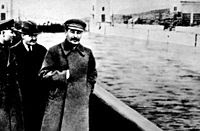...or useful.
1) History should be told for two reasons: to instill pride in the masses, or to instill revolutionary anger among prospective members of Party. Any approach to history other than these two is suspect.
2) When telling history to the masses, the focus should be on a single, easily comprehensible arc. This arc can be either inspiring or boring. If it is inspiring, the masses will feel safe in the trajectory of history and become helpfully complacent. If it is boring, the masses will lose interest in history, spend their time looking for pornography instead, and become both complacent and impotent to effect any real and harmful change. Either will do.
3) When telling history to prospective members of the Party, the focus should be on indignation. Anger fuels the Revolution. Anger justifies necessary excess. If history is disgusting, reprehensible, then rhetorical or physical violence in the name of cleansing history will become more appealing. To fuel the Revolution, history must be told as a power source from which to generate resentment and hate.
4) The purpose of telling history is to separate the listener from history. It is only by severing the people from the past that the future can be born. For the masses, this means encouraging amnesia: it is best if history is something they forget, and not something that informs the way they see the world and live in it. For prospective party members, this means disassociation: they should feel so compelled to condemn history that they have to step outside of it, disavowing national, ethnic, religous, and family ties that bind them to a compromised collective past. Revolutionaries must leave the collective of mankind and become independent individuals before they will be able to turn and subdue the human collective in the name of the Future.
5) The telling of history must change constantly, must remain always new. In one century, the white destruction of Native peoples may be a comforting arc (Manifest Destiny) for the masses; in the next century, this same arc becomes alarming and must be hidden from the masses and used to promote indignation in the Party instead.
6) When using history, don't rely excessively on outright lies and fabricated events--even though such fabrications may seem far more useful than objective realities. People, unfortunately, tend to see through such things in the current era. This is a great disadvantage of our digital age, and an inevitable consequence of too much public access to information.
It is generally equally effective, however, to selectively emphasize real events rather than to narrate false events. For the creative editor, this can be even better than simple fabrication. One of the advantages of this digital age with its overwhelming quantities of information is that everyone relies on editors and summarizers. The glass is, so to speak, half full!



So...for the masses, history should be like candy. For revolutionaries, history is the witch?
ReplyDeleteThat's one of the first intelligent comments anyone has left on this blog.
ReplyDeleteThe truth will out, Drona. You might be able to remove Trotsky from a photograph, or silence one James, but your government is subject to the same consequences as any men. The harder you and your regime try to clamp down on the minds of the people, the more they slip between your fingers.
ReplyDeleteViva James and Democracy!
Es lebe die Freiheit!
More fresh air from a cleaner source. Keep on keeping on James, we'll get you back:
ReplyDelete2nd Counter-Manifesto: Why the Past?
Drona's "Manifesto on History" is worth some attention. I don't agree in any way with his conclusions, but I do think they are, in some respects, accurate descriptions of how we approach the past.
In 1850, Mormon settlers in Provo, Utah, where I work and used to live, killed a local Ute man they suspected of stealing a shirt, cuts his bowels open, and filled them with rocks so they could sink the corpse in the Provo River. When the Utes found they body, they were upset, and began shooting (or stealing?) Mormons' cattle. Local settlers sent representatives to Salt Lake City and, neglecting to mention the murder which had set off the conflict, secured an armed force and authorization to drive out or exterminate adult males in the local population.
My wife shares an article on this and other events in local history with her English class. I read the article a few weeks ago and just finished a set of poems about the surrounding events.
Why remember the painful past? While I was working on the poems, my five-year-old daughter asked what I was writing about. I told her I was writing about a very sad battle, where a woman got killed by a cannon shot. My daughter got upset and said "Cross it out!" Almost as if she believed that my silence would undo old suffering.
It can't. But my speaking of it, if I do so with an appropriate reverence and with the awareness that all people and societies are capable of making terrible mistakes, can help me have the "broken heart and contrite spirit" Jesus talks about.
We ought to remember painful history, I think, to learn humility. To get a sense of intertwined sacredness and vulnerability of life.
If we can learn to face terrible human tragedy without giving way entirely to denial or anger, I think we are on our way to more moral and intentional lives.
One of the greatest tests we face in life is how to use power.
ReplyDeleteIf we use our power only for our own good, we fail. If we use our power for the good of only some others, we have done better, but have still fallen short. If we use our power for the good of all, we pass.
Haven't we gotten beyond the mass man yet? I was *so* sure that was outdated. In addition, tl;dr. ;)
ReplyDelete